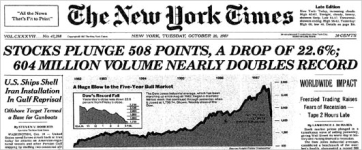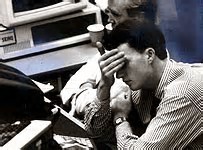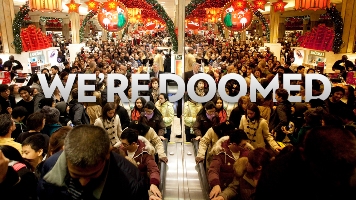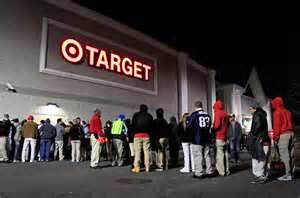
As it turns out, we have quite a few “black” days. In fact, nearly every day of the week has a "Black" event, and most of them are driven by economics.
THE FIRST BLACK FRIDAY
The term “Black Friday” is used in several contexts and dates back to the US financial crisis of September 24, 1869 (when the U.S, gold market collapsed). A "Black ___day" has since become a buzz word to denote financial downturns of large scale. When I looked them up, these economic crises seem too frequent. The list is long but "Black Tuesday", October 29, 1929, and "Black Monday", October 19, 1987, stand out also.

There are any number of opinions and stories about the origins of the Black Friday phenomenon we experience today.
Nancy Koehn writes, "In the 1950s, some factory managers referred to the day after Thanksgiving as "black Friday" because so many workers called in sick. The day, noted one industrial magazine, 'was a disease second only to the bubonic plague' in its effect on employees.'"
The most sources believe that in 1966, the first use of the term "Black Friday" to mean the day after Thanksgiving was coined by the Philadelphia Police Department --and not as a term of endearment. That day was the official opening of the Christmas shopping season and usually brought massive traffic jams, over-crowded sidewalks, a rash of shoplifting, and general chaos. Laura Rosenfeld's article references the annual Army-Navy football game on the last weekend of November as the major cause for the crowds. Probably it was both.
Needless to say, the police hated it and the term was applied in an uncomplimentary way. The people in Philadelphia didn't like the negative connotation and tried to change the term to "Big Friday" but it didn't stick.
THE IRANIAN REVOLUTION
Black Friday is also the name given to September 8, 1978 when shootings in Jaleh Square became the pivotal point in Iranian Revolution which as extinguished any hope of compromise between the protest movement and the Shah's regime.
At that point Black Friday had not become the popular or acceted name for the day after the American Thanksgiving.
AMERICAN INNOVATION SAVES THE DAY
The term Black Friday, as we know it today, came into general use throughout the U.S. during the 1970s, and by the 1980s, merchants were objecting to the negative connotation. So, being the innovative business people that we are, someone came up with the theory that this was the point in the years when retail businesses (which traditionally operated at a loss or “in the red”) started making profits and operated “in the black.”
| Ta-Dah. Now merchants throughout the country love it. IS IT REALLYTHE BUSIEST SHOPPING DAY OF THE YEAR? However, while marketing studies and Snopes.com show the day after Thanksgiving as one of the top six or seven biggest shopping days of the year, it has only risen to the top of the retail sales revenue pile a few times (2003 and 2005). In 2010 the top day was the Saturday before Christmas. Alas, while it isn't the busiest shopping day of the year, it is the day you are most likely to be injured or, sadly, even killed while shopping. http://mentalfloss.com/article/31581/brief-history-black-friday |
OTHER BLACK DAYS
Black Monday
October 19, 1987, is the day when the Dow Jones Industrial Average lost almost 22% in a single day. That event marked the beginning of a global stock market decline, making Black Monday one of the most notorious days in recent financial history. By the end of the month, most of the major exchanges had dropped more than 20%.
Black Tuesday
Black Tuesday is the day marked as the end of the Roaring '20s and the great Wall Street Crash of 1929. A second Black Tuesday event was the Tasmanian fires in 1967.
Black Wednesday
September 16, 1992, is commonly known as the day that George Soros broke the Bank of England. He made one billion dollars profit that day, and the British government was forced to withdraw the pound from the European Exchange Rate Mechanism.
Black Thursday
Thursdays seem to be “black” for a lot of reasons, some of which include:
▪ February 6,1851, a day of devastating bushfires in Victoria, Australia.
▪ The Panic of 1873 when the US bank Jay Cooke & Company declared bankruptcy, triggering a series of bank failures.
▪ October 24, 1929, was the beginning of the Crash of 1929, followed by “Black Tuesday” on October 29, 1929.
▪ October 14, 1943, when the Allies suffered large losses during bombing in the Second Raid on Scheweinfurt during World War II. And so on.
OTHER COLORFUL DAYS
More Colorful Days
There are some “good” days out there, too. At least, days with different colors and some dedicated to more socially-worthy endeavors.
Green Monday
The day Green Monday (coined by eBay) is the second Monday of December. Also economically driven, Green Monday is the biggest online shopping days of the year with only ten more days until Christmas. Experts project consumers will spend $1 billion on holiday shopping this day alone. It also refers to a network of sustainable development practitioners in the UK, which meets on the first Monday of every month to discuss critical environmental issues such as climate change.
Purple Monday
March 26 (Monday) is the Global Day of Epilepsy Awareness. People in countries around the world are invited to wear purple and host events in support of epilepsy awareness.
Pink Wednesday
Wednesday, April 11, 2012, will be Pink Wednesday, the International Day against Bullying, Discrimination, Homophobia and Transphobia in schools and communities.
Red Friday
On Friday, February 3, 2012, National Wear Red Day®, Americans will wear red to show their support for women's heart health.
Who can tell us about more colorful days?
Resources
http://philadelphia.cbslocal.com/2011/11/25/the-little-known-philadelphia-origins-of-black-friday/
http://www.philly.com/philly/...Black_Friday_started_in_Philly.html%20-
http://en.http://en.wikipedia.org/wiki/Black_Friday_(shopping)wikipedia.org/wiki/Black_Friday_(shopping)
http://www.techtimes.com/articles/20879/20141125/history-of-black-friday.htm
http://www.marketplace.org/topics/life/commentary/history-black-friday
http://www.pbs.org/wgbh/americanexperience/features/general-article/grant-black-friday/
http://www.vocabulary.com/articles/wordroutes/the-origins-of-black-friday/
https://blackfriday.com/pages/black-friday-history
http://mentalfloss.com/article/31581/brief-history-black-friday
http://www.todayifoundout.com/index.php/2010/11/black-friday-is-not-the-biggest-shopping-day-of-the-year/
http://www.snopes.com/holidays/thanksgiving/shopping.asp






 RSS Feed
RSS Feed